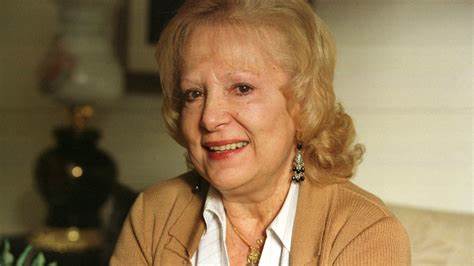Ilídia Dias Ribas (Faro, February 23, 1942 – Cascais, November 7, 2023), better known by her stage name Paula Ribas, was a Portuguese singer, nicknamed the “queen of Twist”. She passed away on November 7, 2023, at Cascais Hospital.
Ilídia Dias Ribas’s parents (her real name) lived in Lisbon but insisted that her daughter be born in Faro. She was an only child and her aunt Maria Virgínia was a great theater actress.
She studied at the Maria Amália high school and did the first 3 years of piano and solfeggio, entering the National Conservatory of Music, where she took the Higher Courses in Piano, with professor Campos Coelho, and Singing, with professor Marieta Amstad.
Seduced by the composer Carlos Nóbrega e Sousa, she replaces her classical music studies with the world of light music. At the age of 17, she asks for the Maestro’s support in preparing for the National Broadcaster competition. In 1952 she made her debut, acting on the program “Ouvindo as Estrelas”, alongside names such as Luís Piçarra and Margarida Amaral. After marriage, she abandoned her artistic life, which she resumed three years later.
She goes on several tours abroad, namely Europe, the Middle East, the United States and Canada, where she performs for the Portuguese colonies.
At the beginning of the 60s, focusing on a repertoire of new songs by the duo Eduardo Damas and Manuel Paião, highlighting the songs “Isto é Lisboa”, “Ai Algarve” and “É Assim A Madeira”. In 1965 she was at the Alvorada publishing house.
A pioneer in Portugal, as an interpreter of versions of great international hits, adapted by António José Lampreia, she is acclaimed as the “Queen of Twist” with themes such as “Let’s Dance the Twist”.
In theater she was the main attraction in the revue “E Viva o Velho” (1966) opposite António Mourão, Camilo de Oliveira, Io Appolloni, Luísa Durão and Costinha. From this magazine comes one of her hits “Maria Lisboa”, by Eduardo Damas and Manuel Paião. In the magazine “Ri-te, Ri-te” she stood out with the song “Quatro Estações”, by Maestro José Mesquita.
It was in Angola that she met Luís N’Gambi, who played in the group Os Rocks) with his two brothers and Eduardo Nascimento.
In cinema, she was the protagonist alongside António Calvário, in the film “O Amor Desceu de Paraquedas”, in 1968, from which another hit “O Meu Barquinho” was born. She recorded the film “Férias em Portugal” alongside Dalida, Alberto Cortez and António Calvário, which was never shown in public.
She records albums in Barcelona for Belter. She records new works by Spanish authors and represents this label at song festivals such as Benidorm, Málaga, Las Palmas, Ourense, among others.
She travels to São Paulo, Brazil, where, for 2 months, she was the attraction of the television program “Caravela da Saudade”.
At this time, she had already recorded more than 20 albums and had performed in 17 countries, singing in several languages (English, French, Portuguese, Italian and Spanish). Her repertoire included everything from “Hino ao Amor” to versions by the duo Bacharach / David.
In 1970 she participated in the FIC-International Song Festival with the “Song of Peace for All Us” by Jorge Costa Pinto and Francisco Nicholson. In Brazil she records an LP with songs such as “My Funny Valentine”, “Noites de California”, “Adeus Lisboa”, “Felizes Seremos”, “Everybody’s Talking” and “My Man”. She returned to Portugal on November 5, 1971.
She definitively settled in Brazil in 1972, with Luis N’Gambi and his mother. She settles in São Paulo where she was hired by the restaurant “Abril em Portugal”.
In 1974 he recorded, for the publisher Discos Marcus Pereira, the LP “Fados Brasileiros” (with compositions and poems by Vinicius de Moraes, Cecília Meireles, Marcos Calazans, Chico Buarque, Chico Alves, Carlos Pena Filho, Caco Velho, Dorival Caymmi and Caetano Veloso.
Later that year, the album “Portugal Hoje” was released by the same label, made in collaboration with Luis N’Gambi, composed only of versions of songs by José Afonso.
She was hired to headline the musical “Brasil em Três Tempos” and was on stage for 18 months at the Hotel Nacional Rio. She toured Brazil with the show “Navegar É Preciso” and which gave rise to the album of the same name.
In 1981 he recorded the album “Tudo Isto É Fado”. With Luis N’Gambi he releases the album “Navegar é precise”. Still in Brazil, they recorded an anthological album “ANGOLA – Folklore and Traditional Songs”, which shows the affinity between Samba and Semba in Angola.
They returned to Portugal in 1989.
“Eu e Você”, a version of Elisa’s theme from the soap opera Tieta, written by Renato Barros and Vadinho, was released as a single by the duo Paula Ribas and Luís N’Gambi. On side B of the album appears “Felizes Seremos”, a Portuguese adaptation of the song “Happy Together”, by The Turtles.
With Discossete they recorded two albums with hits such as “Amar Você”, “Eu e Você” and “Chuvas de Verão”.
Recently, several tributes have been paid to Paula Ribas and Luís N’Gambi, highlighting the dinner on February 7, 2013 at “Restaurante A NINI” in Lisbon, which was attended by friends and colleagues, António Calvário, Maria José Valério, Anita Guerreiro, Eduardo Nascimento among other artists, in an unforgettable night. They were also honored by Chapitô, in January 2015.
Paula Ribas passed away on November 7, 2023, at the age of 91, at Cascais Hospital, where she was hospitalized.





